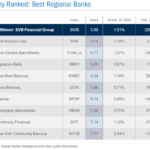There are over 7,000 commercial and community banks in the U.S. In addition, there are over 7,000 credit unions. Hence consumers have a plenty of choices to choose a bank that they want bank with. However the big four “super-banks” dominate the industry just like in other industries. These “super-banks” are Bank of America (BAC), Citigroup (C) JP Morgan Chase(JPM), and Wells Fargo (WFC). The majority of mortgages and deposits are held by these four with the rest split among the thousands of other banks and credit unions.
According to a Reuters report from earlier this month, Bank of America has 5,243 physical branches, JP Morgan Chase has 5,652 branches and Wells Fargo has 6,217 locations.Though many banks offer the latest banking technology to consumers such as mobile banking, they still follow some of the antiquated systems. For example, checks are still widely used and checks processing is one of the big operations of banks. According to a Celent report, the two-thirds of checks written globally are still in the U.S. While much of the world including emerging countries are moving towards electronic payments the U.S. is the only developed country that still continues to adhere to this outmoded payment method.
From USA – world’s largest closed loop payments system? by Brett King in Finextra:
Last year Celent reported that fully two thirds of cheques written globally are still written in the United States. At a time when the world is accelerating towards faster payments, the US has been reinforcing Check21 and propping up a system that was popularized in the 1950s. When put to a vote recently the US banking community voted down the Expedited Processing and Settlement (EPS) initiative at NACHA which would have given real-time ACH payments a chance in the US. As of Q1 2012, the only countries not to have adopted the EMV standard for cards payments were the United States and North Korea. In Q4 of 2012, North Korea adopted the EMV standard leaving the US as the sole remaining holdout, with the debate on EMV rollout for a 2015 timeframe still raging. This is not a globally progressive payments infrastructure.
While free-market capitalism has produced hundreds of startups and innovations in online and mobile payments in the U.S. some basic services needed by consumers are still lacking. For example, it is impossible to easily transfer an amount from one person to another in the same town in the same bank or another bank without paying a hefty fee. This is a common basic feature available in European countries.
Brett noted:
With the exception of Square and PayPal, all of these innovations are very US-specific, and while that’s great for US citizens, the lack of interoperability means that the vast majority of these apps don’t work outside US shores, and hence limit you from sending money cross-border or purchasing from overseas merchants.
Each year close to 70 million tourists travel to the United States, and last year almost 62 million Americans travelled abroad. None of the payments innovations in the US right now address these consumers, nor are they likely to. Some might argue that these 130 million consumers obviously aren’t making enough noise, or retailers, merchants and issuers would have solved the problem already.
While the free market is producing some potentially remarkable innovations, adoption of standards that result in lower cost of delivery, interoperability on a global stage, less payments friction and higher adoption rates should not be viewed as an antithesis to progress.
It is not uncommon for many Americans to spend half a day each month or every few months sorting out their check payments with checkbooks. It is about time that the U.S. banking industry offer some basic services needed by consumers and phase out ancient technologies before jumping into creating apps for the mobile world. Each year millions if not billions are lost by consumers in lost or misplaced checks and banks lose the same if not more in check frauds. So both the parties can benefit by getting rid of this payment method.
Disclosure: No Positions

